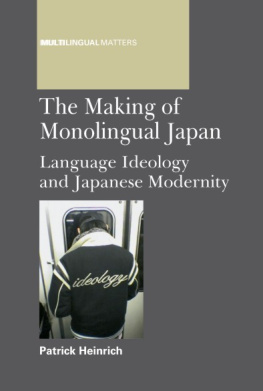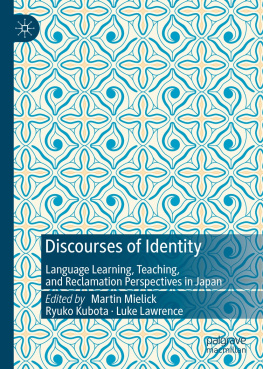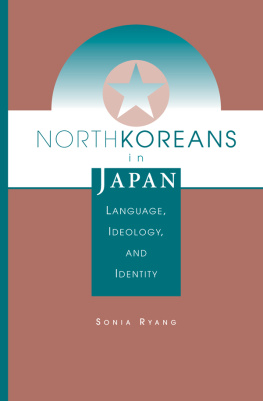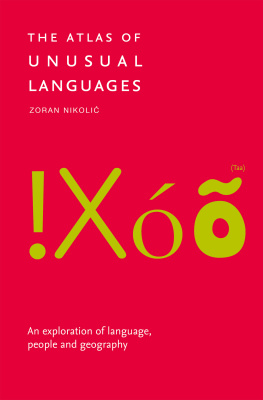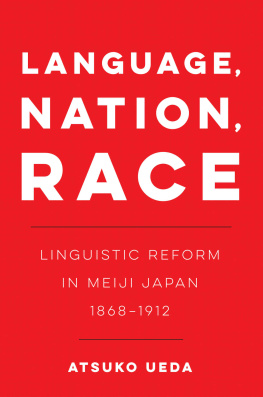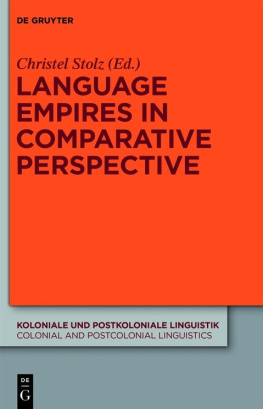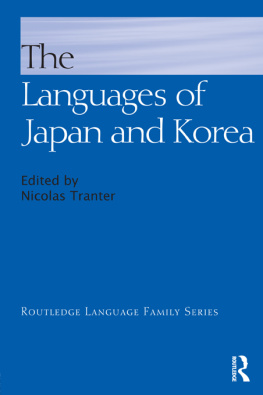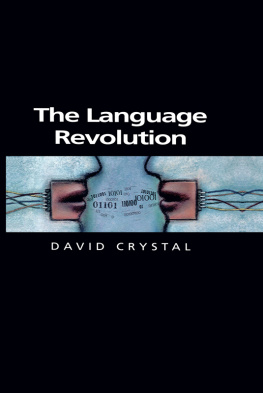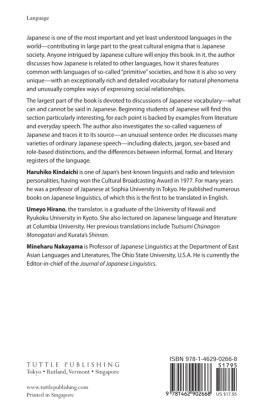MULTILINGUAL MATTERS
Series Editor: John Edwards, St. Francis Xavier University, Canada
Multilingual Matters series publishes books on bilingualism, bilingual education, immersion education, second language learning, language policy, multiculturalism. The editor is particularly interested in macro level studies of language policies, language maintenance, language shift, language revival and language planning. Books in the series discuss the relationship between language in a broad sense and larger cultural issues, particularly identity related ones.
Full details of all the books in this series and of all our other publications can be found on http://www.multilingual-matters.com, or by writing to Multilingual Matters, St Nicholas House, 3134 High Street, Bristol BS1 2AW, UK.
MULTILINGUAL MATTERS
Series Editor: John Edwards, St. Francis Xavier University, Canada
The Making of
Monolingual Japan
Language Ideology and Japanese Modernity
Patrick Heinrich
MULTILINGUAL MATTERS
Bristol Buffalo Toronto
For Rossella
Library of Congress Cataloging in Publication Data
A catalog record for this book is available from the Library of Congress.
Heinrich, Patrick.
The Making of Monolingual Japan/Patrick Heinrich.
Multilingual Matters: 146
Includes bibliographical references and index.
1. Language and languagesStudy and teachingJapan. 2. Second language acquisition Japan. 3. Language and languagesVariationJapan. 4. LinguisticsStudy and teachingJapan. 5. English languageJapan. 6. Language and cultureJapan. 7. JapanLanguages.
I. Title.
P57.J3H45 2012
306.44952dc23 2011048971
British Library Cataloguing in Publication Data
A catalogue entry for this book is available from the British Library.
ISBN-13: 978-1-84769-657-1 (hbk)
ISBN-13: 978-1-84769-656-4 (pbk)
Multilingual Matters
UK: St Nicholas House, 3134 High Street, Bristol BS1 2AW, UK.
USA: UTP, 2250 Military Road, Tonawanda, NY 14150, USA.
Canada: UTP, 5201 Dufferin Street, North York, Ontario M3H 5T8, Canada.
Copyright 2012 Patrick Heinrich.
All rights reserved. No part of this work may be reproduced in any form or by any means without permission in writing from the publisher.
The policy of Multilingual Matters/Channel View Publications is to use papers that are natural, renewable and recyclable products, made from wood grown in sustainable forests. In the manufacturing process of our books, and to further support our policy, preference is given to printers that have FSC and PEFC Chain of Custody certification. The FSC and/or PEFC logos will appear on those books where full certification has been granted to the printer concerned.
Typeset by Techset Composition Ltd., Salisbury, UK.
Printed and bound in Great Britain by the MPG Books Group.
Contents
Preface
This book is the result of several years of research into the languages of Japan as part of Japans history of thought. My interest in this topic began with a study of the reception of western linguistics in modern Japan for my PhD thesis, through which I came to understand that linguistics did not evolve in a vacuum but sought to provide solutions to problems exceeding those of language tout court. In Japan, there is a small branch of linguistics dedicated to what is called kokugo mondai (problems of national language). Having dealt with the very broad topic of the reception of western linguistics, I decided to restrict my research to kokugo mondai for a while. I can still remember the first time I came across the small section on kokugo mondai at the library of the National Institute for Japanese Language in Tokyo. At the time, I was due to take a position at Duisburg University as an assistant to Florian Coulmas, and so I quickly wrote down the titles of all the books on kokugo mondai on the shelves there, with the intention of writing something on this issue during my time at Duisburg. I have long since left Duisburg, and so I can safely say that the topic demanded far more attention than the few books on the shelves at the National Institute for Japanese Language suggested. For this is more than just a book about the problems of a national language in Japan it is about the problems caused by the idea of a national language too. In writing this book, it was not finding material that proved difficult, but deciding on how best to present what material. Undoing ideology demands the conscious questioning of ontological knowledge, but it is not easy to produce academic work on such shaky ground.
Many people have helped me in forming the ideas behind this book. Above all, I am most indebted to my teachers Florian Coulmas, J.V. Neustupn and Josef Kreiner, and their influence is written all over the book. Inoue Fumio, Takaesu Yoriko, Miyara Shinsho and Ishihara Masahide were my hosts during prolonged research visits to Japan, during which times I studied matters that found their way into this book. In Duisburg, Sugita Yuko and Imai Jun discussed many of the issues presented here with me, and in Uchinaa (Okinawa), Fija Byron was an important source of support and friendship. Michael Cresswell helped me to finish the manuscript and provided much needed encouragement while it was being written, and Scott Saft generously supported me while making revisions. Peter Backhaus remembered me saying that I wanted to write a book on ideology, and took the picture that appears on the front cover while studying Tokyos linguistic landscape. I have given dozens of talks at various conferences on matters relating to language ideology, and so it would be impossible to list all those who have contributed in one form or another to the present study, but all contributions were gratefully received. My research into language ideology was supported by scholarships from the Japanese Society for the Promotion of Science, the German Science Foundation (DFG), the German Academic Exchange Program (DAAD), the Japan Foundation and the Humboldt Foundation. Their kind support, too, was very much appreciated. I am also grateful to the anonymous reviewers for their helpful comments, to John Edwards for having this book be part of his series, and at Multilingual Matters to Anna Roderick for overseeing the process that turned a manuscript into a book.
A brief word on conventions. Japanese words are transcribed in the modified Hepburn system, while Japanese names are given in the traditional manner of family name first. Okinawa is termed as Uchinaa here, as in the local language, because many of my friends and colleagues there were uncomfortable with the Japanese term Okinawa. It remains in place, of course, for designations such as Okinawa Prefecture. All translations into English are mine unless otherwise accredited. Tradition also dictates that I hereby declare all remaining errors and inadequacies mine.
Finally, let me acknowledge that taking so many years to write one book does not come without its share of problems. I had to move several times to take up new positions, and while that was fine with me, it was a burden on my family. That they never wavered in their support for me has truly humbled me. My son Stephen is cool enough to still tease me for taking such a long time to write such a short book, but I know my wife Rossella will be more proud of this work than I will ever be. I shall dedicate it to her.
Patrick Heinrich
Sicily, Summer 2011
1 Language Ideology as a Field of Enquiry
Language ideology is an ever-present component of our communicative behaviour, for it regulates the way we talk. Yet this is something of which most of us are unaware, and so we assume our linguistic choices and attitudes to be entirely natural. The term ideology is therefore a fitting one, and while language ideology escapes the attention of many of us most of the time, once one purposefully starts looking for it one encounters it everywhere. Consider the following examples of language ideology at work in Japan.
Next page
